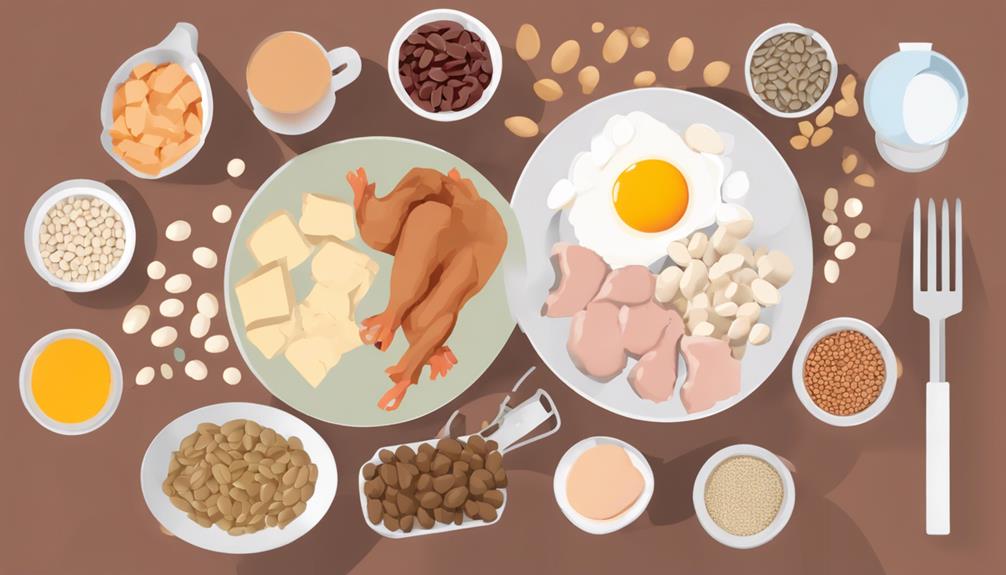How Much Protein Do I Need Every Day?
If you were to compare your body to a machine, protein would be like the fuel that keeps it running smoothly.
But, do you know exactly how much of this vital nutrient you need each day to keep your body functioning optimally?
Understanding your daily protein requirements can be crucial for your overall health and well-being.
Let’s explore how different factors influence your protein needs and how you can ensure you are meeting them effectively.
Key Takeaways
- Protein needs vary based on age, activity level, and health factors.
- Balancing protein intake with other nutrients is crucial for a healthy diet.
- Consult healthcare providers to determine ideal protein sources for individual needs.
- Protein deficiency can lead to muscle loss, weakened immunity, and slow wound healing.
Protein: The Building Block of Life
Protein serves as the fundamental building block of life, essential for the growth and repair of tissues in your body. The protein synthesis process involves creating new proteins by linking together building blocks called amino acids. This intricate process occurs within your cells, following instructions encoded in your DNA.
When you consume protein-rich foods, such as meat, fish, dairy, or plant-based sources like beans and nuts, your body breaks down these proteins into amino acids through the protein digestion process.
Enzymes in your stomach and small intestine work to break down the proteins into their constituent amino acids, which are then absorbed into your bloodstream. You can now buy supplements for the samepurpose from https://www.amazon.com/Nutricost-Whey-Protein-Concentrate-Unflavored/dp/B01KITQG0A
Once in your bloodstream, these amino acids are transported to cells throughout your body to support various functions, including tissue repair, muscle growth, and enzyme production. Understanding the processes of protein synthesis and digestion is crucial for grasping the vital role that protein plays in maintaining your overall health and well-being.
Understanding Protein’s Role in the Body
Understanding the crucial role that protein plays in your body is essential for maintaining optimal health and well-being. Protein is involved in various functions, including protein metabolism and protein synthesis.
Protein metabolism refers to the processes by which proteins are broken down into amino acids and then utilized for energy or to build and repair tissues. On the other hand, protein synthesis is the creation of new proteins within the cells, essential for growth, repair, and maintenance of body tissues.
Protein metabolism is a dynamic process that occurs continuously in your body to ensure a balance between protein breakdown and synthesis. It’s crucial for cell function, immune response, and the overall structure of tissues like muscles, skin, and organs.
Meanwhile, protein synthesis is vital for muscle growth, enzyme production, hormone regulation, and various other physiological functions.
Factors Affecting Daily Protein Needs
Considering your individual needs and lifestyle, determining the factors that influence how much protein you should consume daily is crucial for maintaining optimal health and supporting your body’s functions.
Two key factors affecting daily protein needs are protein absorption and protein digestion.
Protein absorption refers to the process by which your body takes in protein from the foods you consume. Factors like age, gut health, and the presence of certain medical conditions can impact how efficiently your body absorbs protein.
Similarly, protein digestion plays a vital role in determining your protein requirements. Digestive enzymes break down dietary proteins into amino acids, which are then absorbed by the body. Issues with digestion, such as digestive enzyme deficiencies or gastrointestinal disorders, can affect how well your body processes and utilizes dietary protein.
Understanding these factors can help you tailor your protein intake to meet your body’s specific needs and optimize your overall health and well-being.
Recommended Protein Intake Guidelines
To determine the appropriate amount of protein you should consume daily, it’s essential to refer to recommended intake guidelines established by health authorities and nutrition experts. The Recommended Dietary Allowance (RDA) for protein is 46 grams per day for women and 56 grams per day for men. However, individual protein needs may vary based on factors like age, activity level, muscle mass, and overall health.
Incorporating protein-rich foods into your diet is crucial. Lean meats, poultry, fish, eggs, dairy products, legumes, nuts, and seeds are excellent natural sources of protein. Additionally, protein supplements can be useful for individuals who struggle to meet their protein requirements through whole foods alone. Protein supplements like whey protein, soy protein, or pea protein powders can be convenient options to increase your protein intake.
When looking for protein-rich snacks, consider options like Greek yogurt, cottage cheese, hard-boiled eggs, nuts, seeds, or protein bars. These snacks can help you meet your protein goals while keeping you satisfied between meals. Remember, balancing your protein intake with other essential nutrients is key to maintaining a healthy diet.
Protein Requirements for Different Lifestyles
When it comes to protein requirements for different lifestyles, understanding your daily protein intake is crucial.
Athletes have increased protein needs to support muscle recovery and growth.
Exploring vegetarian protein sources can help individuals meet their protein requirements while following a plant-based diet.
Daily Protein Intake
For individuals leading an active lifestyle, the daily protein intake should be tailored to support muscle repair and growth. Protein sources such as lean meats, poultry, fish, eggs, dairy products, legumes, nuts, and seeds are essential to meet these increased needs.
Incorporating a variety of these protein sources into your meals can help ensure you’re getting all the necessary amino acids for muscle maintenance. While whole foods should be your primary protein source, in some cases, protein supplements can be convenient for meeting your daily requirements.
However, it’s important to remember that supplements shouldn’t replace whole food sources when possible. Always consult with a healthcare provider or nutritionist to determine the right amount of protein and the best sources for your individual needs.
Athletes and Protein
Adjusting your protein intake according to your level of physical activity is crucial for supporting muscle maintenance and growth, particularly for athletes with high energy demands. When it comes to athletes and protein, here are three key points to keep in mind:
- Protein Supplements:
Athletes may require higher protein intake than sedentary individuals. Protein supplements like whey protein can be convenient for meeting increased protein needs.
- Protein Timing:
Consuming protein before and after workouts can aid in muscle recovery and growth. Aim to have a protein-rich meal or snack within an hour of finishing your exercise session.
- Stay Informed:
Consult with a nutritionist or dietitian to determine the right protein intake for your specific athletic needs and goals. Proper protein intake is essential for optimizing athletic performance and recovery.
Vegetarian Protein Sources
Exploring various plant-based options can provide ample protein for individuals following different lifestyles. Plant-based proteins, such as beans, lentils, tofu, tempeh, quinoa, nuts, and seeds, are rich sources of protein for vegetarians.
Including a variety of these protein-rich vegetarian meals in your diet ensures that you meet your daily protein requirements. For example, a meal of black beans and quinoa or a stir-fry with tofu and vegetables can be delicious and nutritious ways to get the protein you need.
Additionally, incorporating nuts and seeds into your snacks or salads can boost your protein intake throughout the day. By being mindful of your food choices and including a diverse range of plant-based proteins, you can easily meet your protein needs on a vegetarian diet.
Protein for Muscle Building and Recovery
Wondering how protein contributes to muscle building and recovery? Protein plays a crucial role in helping you achieve your fitness goals. Here’s how it benefits muscle growth and aids in recovery:
- Protein Timing for Muscle Growth: Consuming protein-rich foods or supplements around your workout can enhance muscle protein synthesis, which is essential for muscle repair and growth. Aim to include protein in your meals and snacks throughout the day to support continuous muscle building.
- Protein Supplements for Recovery Benefits: Protein supplements like whey protein are popular among athletes and fitness enthusiasts for their quick absorption and high amino acid content. These supplements can help speed up recovery post-exercise, reduce muscle soreness, and support muscle repair.
- Balanced Protein Intake: Ensuring you consume an adequate amount of protein daily is key to promoting muscle building and recovery. Be mindful of your protein intake from a variety of sources to meet your body’s needs for optimal performance and results. Remember, consistency is key in harnessing the benefits of protein for muscle health.
Signs of Inadequate Protein Intake
If you’re not consuming enough protein, your body might show signs of deficiency, such as muscle loss, weakness, or slow recovery from injuries. Low protein intake can also lead to hair loss, skin problems, and a weakened immune system.
Warning signs of inadequate protein levels include constant fatigue, frequent cravings for unhealthy foods, and difficulty maintaining or building muscle mass.
Symptoms of Protein Deficiency
Experiencing fatigue, muscle weakness, or slow wound healing could indicate that you aren’t consuming enough protein to meet your body’s needs. Protein deficiency poses health risks and requires specific dietary strategies to address it effectively.
Here are some common symptoms of protein deficiency:
- Fatigue: Protein is essential for energy production. Inadequate intake can lead to feeling tired and worn out.
- Muscle Weakness: Protein is crucial for muscle repair and growth. Not getting enough can result in muscle weakness and decreased strength.
- Slow Wound Healing: Proteins are necessary for tissue repair. Insufficient protein intake can slow down the healing process of wounds and injuries.
If you notice these signs, consider increasing your protein intake through a balanced diet to support your overall health and well-being.
Effects of Low Protein
Not consuming enough protein can have significant effects on your body’s functioning and overall health. Protein deficiency consequences include muscle wasting, weakened immune function, slow wound healing, and stunted growth in children.
To prevent these issues, it’s crucial to ensure an adequate protein intake through a balanced diet. Low protein intake can lead to a negative nitrogen balance in the body, causing a breakdown of muscle tissue to meet protein needs. This breakdown can impact muscle mass, strength, and function over time.
To maintain muscle health, it’s essential to consume enough high-quality protein sources regularly. By being mindful of your protein intake and incorporating protein-rich foods into your meals, you can support your overall health and well-being.
Protein Intake Warning Signs
Recognizing warning signs of inadequate protein intake is crucial for maintaining optimal health and well-being. Here are three key signs that indicate you mightn’t be getting enough protein:
- Muscle Loss: Inadequate protein intake can lead to muscle wasting as your body breaks down muscle tissue to meet its protein needs.
- Hair, Skin, and Nail Issues: Protein deficiency can manifest in brittle nails, hair loss, and dry, flaky skin due to the role of protein in maintaining these structures.
- Constant Fatigue: Protein is essential for energy production, and insufficient intake may leave you feeling tired and sluggish even after adequate rest.
To prevent these signs and maintain a healthy protein intake, ensure your diet includes a variety of protein sources like lean meats, dairy, legumes, and nuts.
Tips for Meeting Your Protein Goals
To effectively meet your protein goals, focus on incorporating a variety of protein-rich foods into your daily meals and snacks. Including protein-packed snacks and preparing protein-rich meal preps can help you reach your daily protein target. Here are some tips to assist you in meeting your protein goals:
| Protein-Packed Snacks | Protein-Rich Meal Prep |
|---|---|
| Greek Yogurt with Nuts | Grilled Chicken Breast |
| Hard-Boiled Eggs | Lentil Soup |
| Cottage Cheese with Fruit | Quinoa Salad with Chickpeas |
| Almond Butter on Whole Grain Toast | Tofu Stir-Fry |
These options offer a diverse range of proteins, ensuring you receive various essential amino acids. When planning your meals, aim to include a protein source in each one, such as lean meats, fish, eggs, dairy products, legumes, nuts, or seeds. Additionally, consider consulting with a dietitian to personalize your protein intake based on your specific needs and lifestyle. By implementing these strategies, you can effectively meet your daily protein requirements.
Balancing Protein With Other Nutrients
For optimal health, it’s crucial to strike a balance between your protein intake and other essential nutrients in your diet. Achieving this balance ensures that your body functions at its best and maximizes the benefits of the nutrients you consume.
Here are some key points to consider when balancing protein with other nutrients:
- Protein Absorption: Different sources of protein are absorbed at varying rates in the body. Animal-based proteins like meat and dairy are usually absorbed more efficiently than plant-based proteins. To ensure adequate absorption, aim for a variety of protein sources in your diet.
- Nutrient Interactions: Certain nutrients can enhance or hinder the absorption of proteins. For example, vitamin C can improve the absorption of non-heme iron found in plant-based proteins. On the other hand, excessive calcium intake can interfere with the absorption of iron and zinc. Be mindful of these interactions when planning your meals.
- Balanced Diet: To optimize protein absorption and overall nutrient intake, focus on maintaining a well-rounded diet that includes a variety of proteins, fruits, vegetables, whole grains, and healthy fats. This approach ensures that you get the necessary nutrients to support your health and well-being.
Conclusion
In conclusion, protein is essential for overall health and well-being. It serves as the building block of life, supporting muscle growth, recovery, and various bodily functions. Meeting your daily protein needs is crucial for maintaining optimal health.
Just like how a strong foundation is necessary for a sturdy building, adequate protein intake is the cornerstone of a healthy lifestyle. Make sure to prioritize protein in your diet to support your body’s needs and reach your health goals.







